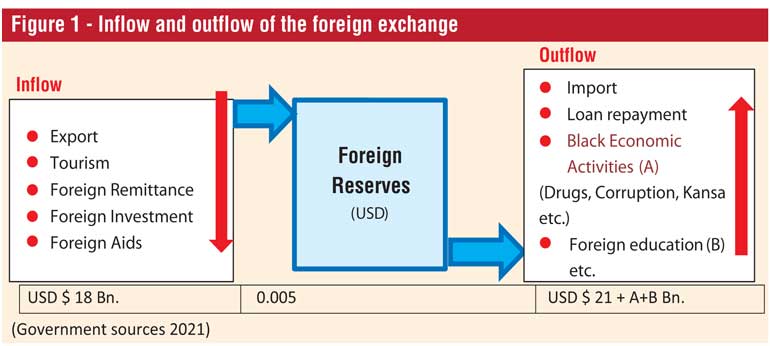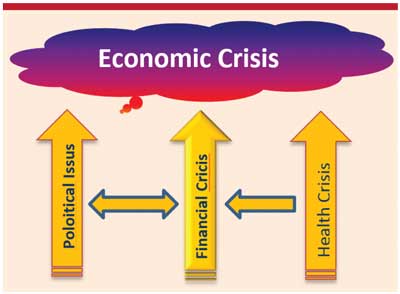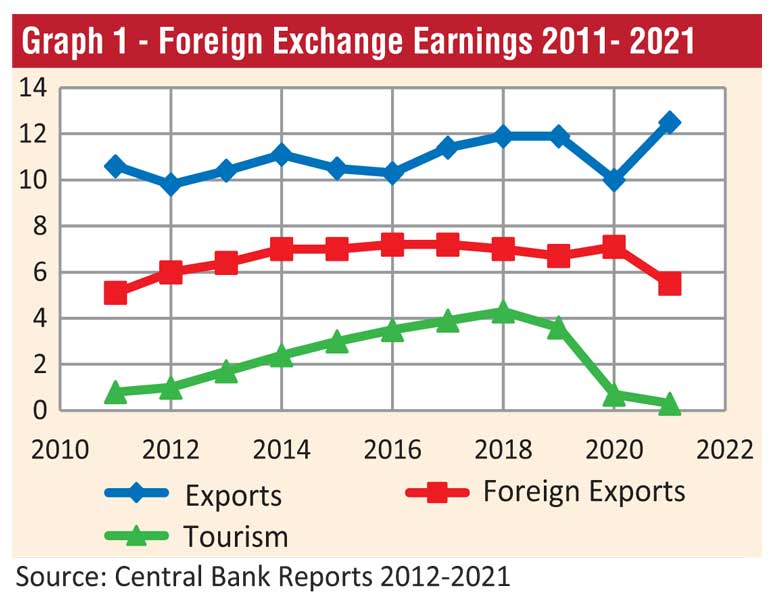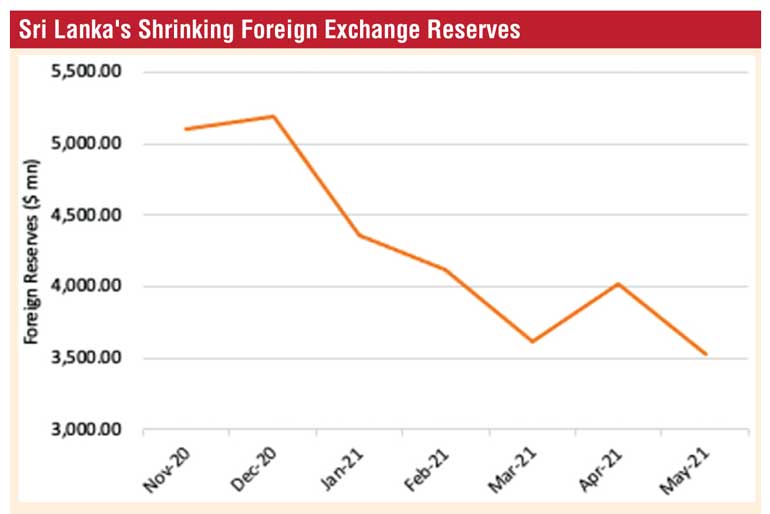Thursday Feb 19, 2026
Thursday Feb 19, 2026
Tuesday, 7 June 2022 03:07 - - {{hitsCtrl.values.hits}}

 Sri Lanka is termed “The pearl of the Indian Ocean” while Singapore is termed “The little red dot”. This is so perhaps because Sri Lanka has a greater value attached to it. Yet currently she is facing an unprecedented economic crisis about which many analyses, proposals and solutions are being expressed. It is now of national necessity to examine minutely and prescribe viable solutions to these developments. When one scrutinises the nature of the crisis, it is apparent that it encompasses every section of the population either through financial, political or through health issues.
Sri Lanka is termed “The pearl of the Indian Ocean” while Singapore is termed “The little red dot”. This is so perhaps because Sri Lanka has a greater value attached to it. Yet currently she is facing an unprecedented economic crisis about which many analyses, proposals and solutions are being expressed. It is now of national necessity to examine minutely and prescribe viable solutions to these developments. When one scrutinises the nature of the crisis, it is apparent that it encompasses every section of the population either through financial, political or through health issues.
It is necessary to analyse our economic crisis in the context of a global crisis. In the given illustration we can identify 3 salient factors which during this period, worked against us to cause an economic crisis.
The political issues
According to the Constitution we are a democratic socialist country. After independence, even though there were several parties representing the majority and the minority ethnic groups, it is two major parties that wielded power. They, from time to time followed capitalist, or socialist policies and either an open or closed economic policy. Prior to 1978, the Prime Minister followed a completely closed economic policy which was rejected in 1978 by the UNP regime when an Executive President was installed with full executive powers. The Prime Minister lost most of his power to the President
Currently, the economic problems have exacerbated along with people’s other issues culminating in a mass people’s struggle. As I was composing this article, people demands that the Prime Minister and Cabinet must resign did indeed occur. The demand that the President too should resign is still continuing. Most huge foreign funded projects were not feasible economically, financially, environmentally or technically due to politicians’ intervention on the decision-making process. The Return on Investment (ROI) is very low in most of those projects and it is difficult to bear higher maintenance cost. Further, the Government sector employment procedure also has the same issues and has been a further burden to the general public due to political appointments and unproductive youth employment projects while skills gaps occurred in many industrial sectors.
 The financial crisis
The financial crisis
In order for a country to have a stable economic status, it should have a balanced financial status and a balanced commodity market. However currently there is an imbalance in both these sectors. Prior to analysing the causes for the financial crisis, it is necessary to examine the nature of the financial crisis and the behaviour of fluctuating factors in its backdrop. In this context primarily the following factors have to be considered:
1. Why did the foreign reserve of 7 billion reduce to 0.005 billion
2. Why did the gold reserve of 20 tons deplete
3. The reason for the depreciation of the rupee against the dollar. It was depreciated 94.6% over two years from 185 to 360 while in April it rose sharply by 29.8%. It is necessary to examine why our financial reserves reduced sharply
Exports
Even though, with the COVID-19 pandemic in 2019 export income fell by a billion dollars, in 2021 it rose by 2.5 billion (Graph 1). Export market and industries are facing the big challenges due to lack of materials, fuel and increasing production cost. It will again cause the decreasing of forex and work as a cyclical effect.
Tourism
There are more than 600,000 employed in tourism directly or indirectly, and it provides 12.6% of the GDP (2019). But it reduced to 6% in 2020. In 2018, it produced $ 4.4 billion despite COVID-19 but in 2021 it produced only 9.3 million. But by end 2021 until March this year there was an increase in revenue but since then it decreased again owing to political disturbance.
Foreign remittances
Foreign employment provides 8% of the national product and so it is a valuable source of employment. Expatriate employees send back their earnings in various ways. Even though it is a major source of earing foreign exchange, foreign employment had decreased during the past two decades. In 2014, 267,000 went out for employment but in 2019 it fell to 191,000 and in 2020 owing to Covid-19 the number was 50,600. Dollar remittances which stood at 7 billion fell to 5.4 billion. Unauthorised transfers such as Mundial and Havala systems reduced the inflow from formal banking practices.

Foreign Direct Investment and foreign aid
Two other channels through which foreign funds enter the country are the FDIs and foreign aid. From 1970 to 2005 FDIs were slow in coming but with the end of the war it picked up. In 2018 it reached its maximum at 1.6 billion, but by 2019 with the pandemic it went down to 0.6 billion. Later it picked up and reached 1.78 dollars. There is a positive correlation between peace and investment and so there could be a problem in investment in the near future.
In examining foreign aid we note that in 2012 we received 490 million dollars but by 2018 it had reduced to 197.4. During the last three decades non-governmental organisations also received aid. But as a result of the Government’s policy of adopting stringent rules and tedium in obtaining approval for projects have reduced the inflow.
Outflow of foreign exchange and the fall in foreign reserves
The main financial crisis is a result of the increase in loan repayment. According to Central Bank statistics, the ratio of debt servicing to the GDP was above 102% between 2001 and 2004, while between 2020 and 22 it was between 101% to 115% It has been unavoidable to stem the outflow of exchange because of the reduction in exchange and because of government expenditure. The reduction of the dollar reserves, and the fall in the dollar ratio, imports have increased in price drastically. In order to contain government expenditure, interest rates are kept low while printing money has resulted in an increase in money supply causing hyper inflation.
Further there is a large exodus of students who leave for studies out of whom only a few return. This results in a large outflow. On the other hand there is a strong outflow because of the black economy operating and because of money transactions outside government financial regulations. It is not possible to state the value of this definitely but it will be in billions.

Strategies to increase foreign reserves
We have identified three major factors that affected the economic crisis – political issues is the most crucial factor that led to the economic crisis through financial crisis. Since the health disaster is under control and we need more attention on political issues. Within the short period it is difficult to solve all structural issues in politics. As demanded by the people it has made big changes of reappointing the Prime Minister and the Ministers of Cabinet. People are protesting further try to reappoint the president and bring back corrupted money which was invested in other countries.
If it is possible to do, it will be the shortest and easies way to settle the foreign loan and recover the economy soon. What will be the possible solution under the current situation? Monetory policies and fiscal policies are the tools to be handled by the Governor and the Government to solve the issues. At present it has taken some favourable steps by adjusting the interest rate and exchange rate but could not solve the hipper inflation on essential goods so far.
We have to address the major source of foreign exchange earnings in the tourism sector, exports, increase the foreign remittance as well as receive more foreign aids through social and livelihood development project instead of the loan.
We can now see how a short-term policy planning together with the effects of the pandemic have aggravated the crisis in the country. Its continuation will depend on the decisions the authorities in the country take. It is imperative that we bring this situation under control in order to address the economic crisis. We must also establish an internationally accepted stable peaceful government.
In order to develop export industries and export agriculture, the Agriculture Ministry should be made more efficient and expert advice must be sought. Each and every piece of land must be cultivated. Japan and Middle East countries are cultivating fruit and vegetable with a very difficult environment but Sri Lanka has the most agricultural-friendly environment. Further, the country has the traditional method of cultivation without using chemicals. However in commercial farming it is necessary to encourage local fertiliser manufacturers by offering incentives to chemical and organic fertiliser manufacturers.
Every possible assistance must be rendered to these entrepreneurs. The subsidy packages lost when we became an upper or middle income country should be brought back. International relations should be strengthened through capable officers to get quota and tax relief to promote export. On the other hand with the support of Sri Lankans living overseas we must earn more than $ 15 billion income from the exports. Promoting exports will be one most feasible solution to overcome the prevailing crisis.
In the short time, promoting tourism is the easiest way of gaining dollars to the country. Therefore it is a compulsory need to reinstall the peaceful hospitality environment and provide all facilities to fulfil their transport and supported services. Tourist taxi drivers, guides and service providers should have a priority method to supply fuel and ensure the safe service. All parties must unite to solve the political crisis especially because tourism is an answer to the economic issues. Among Asian countries unlike Singapore and other countries Sri Lanka can offer a varied environment. In order to take advantage of this Sri Lanka must employ professional marketers and related experts to attract tourists.
It is necessary to remove the bottlenecks that are present in projects involving non-repayable loans, and low-cost long-term soft loans. Projects for renewable energy and the projects for the reduction of fuel dependence, such as wind, solar power and small scale hydro power plants and new technology must be given priority. It is also necessary to identify useful employment patterns for the country, and new technology, encourage the manufacture of chemical and organic fertiliser, pharmaceuticals and herbal products. Therefore economy will helped if we promote the import subsidiary manufacturing industries to reduce cost of import.
A committee of experts needs to be appointed to evaluate foreign investment and they will encourage investment and promote an investor friendly environment. We are at 99 ranks in the Ease of doing business index but we must aim at a place similar to a country like Vietnam (70) before we proceed to be with countries like Singapore and Japan.
Increasing skilled workforce is the most viable solution for increasing productivity as well as increasing foreign exchange through skilled migration. The vocational training process needs to be accelerated to deliver short-term training to promote foreign employment such as care giver, nursing assistant, baker, etc. Thus both the Government and the private sector must address to train people in NVQ certification for demanded jobs. Soft skills including language competencies are higher value addition to trainees on foreign employment. Each training provider should have a mechanism to provide foreign language training facilities for their trainees.
At the same time foreign employment agencies must widen their services and enable people to apply for foreign work with affordable charges on an honest premise. Above mentioned recommendations will support to significantly overcome the prevailing crisis but it should have multi solutions which I hope to publish in part two of this article.
(The writer is Director General at the Tertiary and Vocational Education Commission (TVEC).)